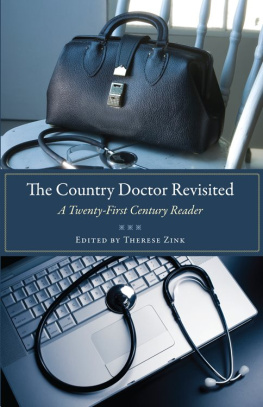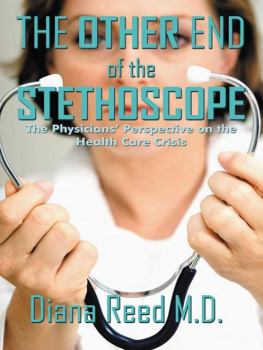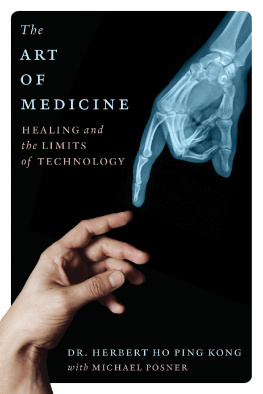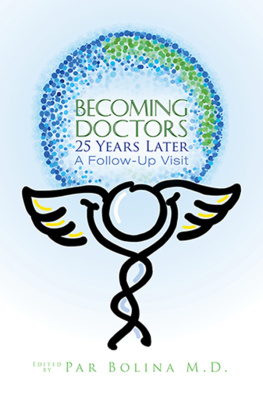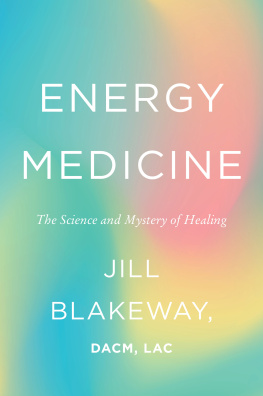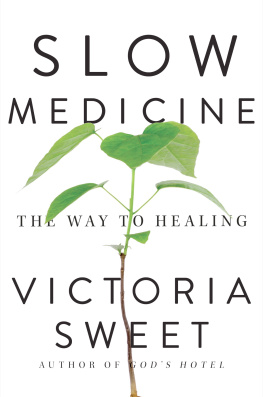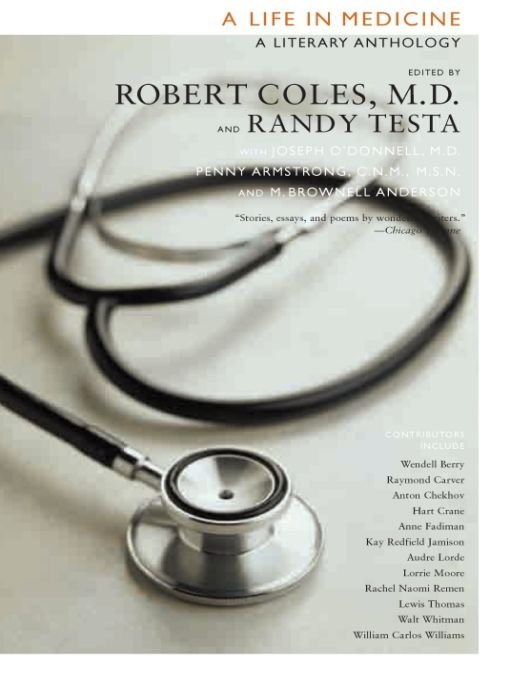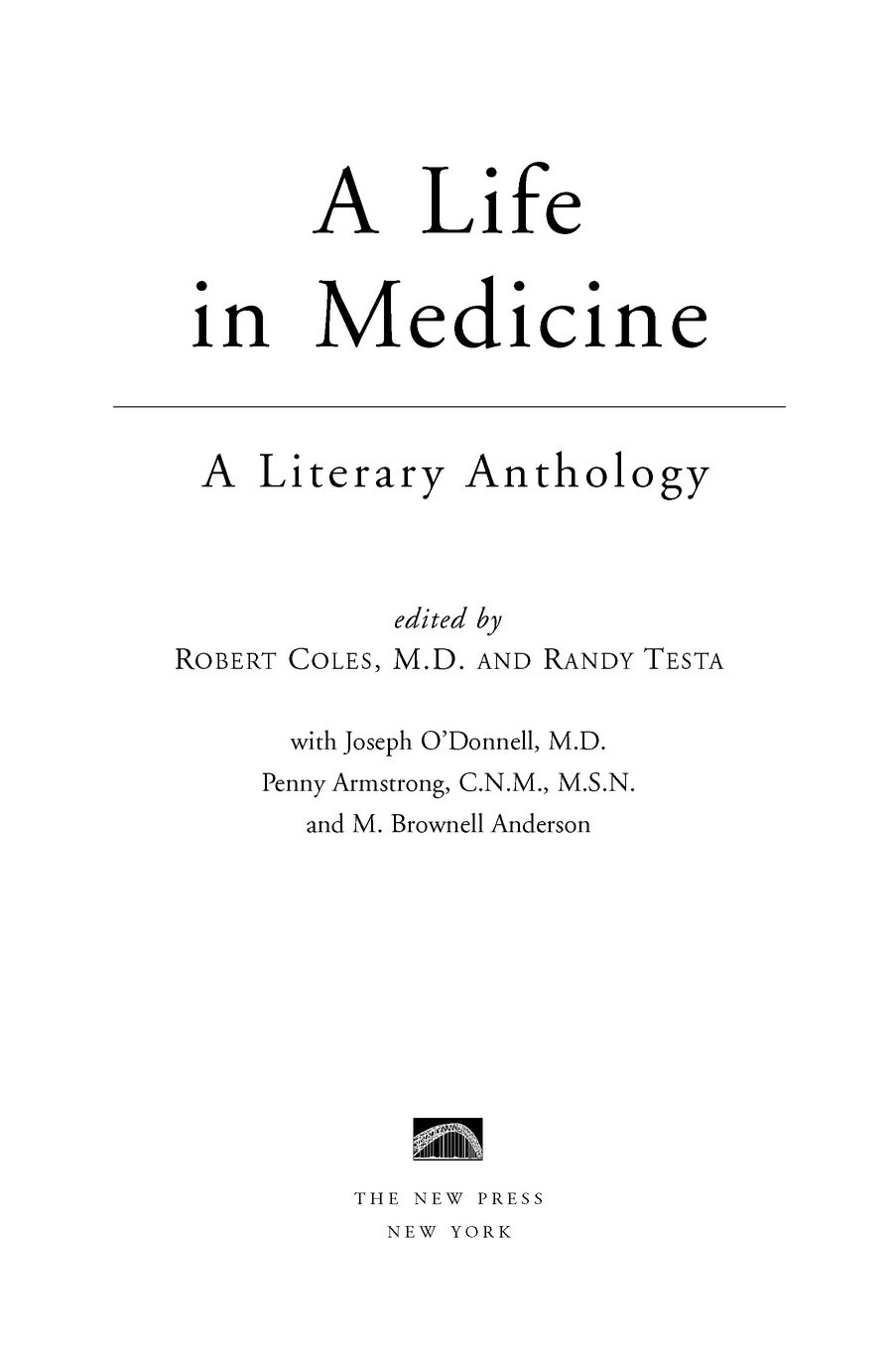Table of Contents
To the memory of Dr. William Carlos Williams,
whose words and thoughts inspired and
helped so many of us in medicine;
and to my family with much love.
ROBERT COLES
Acknowledgments
This book is the result of many peoples generous efforts and much grace. Accordingly, we thank Joe ODonnell, Penny Armstrong, and Brownie Anderson for their wise assistance; Tom Mellers for permissions help; and Samita Sinha and Diane Wachtell at The New Press for their direction, help, advice, and humor.
ROBERT COLES AND RANDY TESTA
Preface
A beginning medical student struggling to obtain a medical history is delighted by the story his elderly patient tells him instead. A mother whose child has just been diagnosed with cancer walks into the pediatric oncology unit for the first time and the ground drops out from under her. A nurse/poet meditates on the secret moments she has shared with patients, just before and just after their deaths. This anthology collects moments like these, gleaned from a life in medicine, moments rendered poignant through stories, poems, and essays. Each in its own way examines the relationship between patients and health care professionals. Some pieces are by doctors, nurses, and residents; others are by laypeople. Some pieces are filled with outrage, others with gratitude. Some offer prescriptions. All offer perspective.
In the literature and medicine courses taught by those of us compiling this anthology, we frequently hear students of our disciplines complain bitterly that, although they love reading literature, they dont really have time for it. They must learn hard science, they insist, and they become fearful that time spent with literature is time spent away from medicine. Sadly, this view often originates with their teachers, who are not only entrusted with teaching medicine, but with determining the very structure of medical education.
Dr. Rita Charon of Columbia Universitys College of Physicians and Surgeons points out that, for all its emphasis on scientific knowledge, the work of medicine in considerable part rests on the doctors ability to listen to the stories that patients tell; to make sense of these often chaotic narratives of illness; to inspect and evaluate the listeners personal response to the story told; to understand what these narratives mean at multiple (and sometimes contradictory) levels, and to be moved by them. Ron Carson, director of the Institute for Medical Humanities at the University of Texas Medical Branch, Galveston, offers further justification for literature in the education of health care professionals: learning to read with care stories about patients helps health care professionals become careful readers of their patients.
In 1996 the Association of American Medical Colleges (AAMC) embarked on a major new initiative to assist medical schools in their efforts to educate medical students more fully. Titled the Medical School Objectives Project (MSOP), it identified altruism, knowledge, skill, and duty as the four attributes necessary for medical school graduates to thrive in the current and future health care environment. We have organized the selections in A Life in Medicine using these four objectives as section headings, and have provided the AAMCs full definition of each objective at the opening of each section of readings. It is our hope that multiple perspectives will allow for deeper insight into the implications of the four objectives, as well as what Dr. Coles has described as a moral education.
One goal of the MSOP is to provide a blueprint or framework upon which medical schools and educators can build unique approaches to medical education. Our goal is to offer narrative knowledge as a means for examining with fresh perspective the daily responses we have to those on whose behalf we work. We hope this book represents a fundamental toolfor dialogue, debate, insight, and clarificationfor all of us who find ourselves engaged by a life in medicine.
INTRODUCTION
The Moral Education of Medical Students
ROBERT COLES
In Middlemarch, George Eliots greatest novel, she remarks at one point that character is not cut in marbleit is not something solid and unalterable. She pointedly amplifies that observation with a medical simile (in a novel that tells, among other things, of a doctor whose moral values go through a marked transformation): It is something living and changing, and may become diseased as our bodies do. Indeed, throughout her writing career, Eliot struggled hard with moral questionsshe was constantly posing them to her fictional protagonists and, thereby, to her readers. The physician, Dr. Lydgate, who figures prominently in Middlemarch, starts out as an intensely idealistic young man, determined to use his professional skills on behalf of needy people, no matter their background, and determined, as well, to advance his professions knowledge, through research, as best he can. Yet, in a few short years, he is a society doctor, all too cynically catering to those who can buy his time. He had gained an excellent practice, we are told at the storys end, alternating, according to the season, between London and a Continental bathing-place; having written a treatise on Gout, a disease which has a good deal of wealth on its side. His skill was relied on by many paying patients, but he always regarded himself as a failure: he had not done what he once meant to do.
That second sentence is especially important. Eliot had no interest in being a scold. Rather, she meant to explore the manner in which, not rarely, we disappoint our own selves, forsake certain ideals or principles that helped shape our lives at crucial momentsonly to relinquish their hold on us. She wondered whyhow it comes about that we lose our moral moorings, shift the moral direction of our lives, end up doing things we once regarded as unworthy of our own standards of behavior. A half-century later an American novelist, F. Scott Fitzgerald, worried over the same matter. He gave us, in Tender Is the Night, the physician Dick Diver, whose last name conveys the essence of the novels action: a steep decline in a persons self-respect, never mind his responsibility to the ethical norms of his chosen profession. Like Eliot, Fitzgerald had no great interest in wagging his finger at his readers or at doctors in general. He was a talented storyteller who knew that moral irony abounds in our lives; that we can claim an integrity which we gradually let slip by us, an integrity undermined in small, day-by-day ways that may seem inconsequentialuntil, in their sum, they have had their unmistakable effect. Not that either Dr. Lydgate or Dr. Diver suffers any great pangs of conscience as a result of the personal change that befalls each of themand therein lies the unnerving reminder to us who get to know them, page by page: we, too, have agile minds that are quite capable of fooling us, that spin webs of rationalizations and selfdeceptions, to the point that were unself-consciously caught in a life whose implications we have long ago stopped examining, never mind judging.
How to call upon such novelists (they at times become moral visionaries) in our lives, in our work, if we are doctors at medical schools who are trying to teach the young men and women in our classes what it means to be a good doctor? To be sure, factual knowledge counts a lot; we have to impart it constantly, and our students are mightily challenged by the demands on their memory as they absorb blackboards full of information, textbooks full of explanations, and as they try to keep in mind what they have learned in long laboratory sessions. All too often, though, those students will wonder what the point of such an experience is, especially in the first two years of their medical school education, and they will resort to gastrointestinal imagery as they try to gain any possible perspective on a relentlessly demanding, exhausting, unnerving experience: ingestion, regurgitation. Some students will utter terse lines of poetry that stress the attitude of utter compliance required (ours not to reason why, ours but to do and die) or stress the desired outcome as a justification for what seems to be an arbitrary kind of force feeding meant to test tenacity (survival is all).



